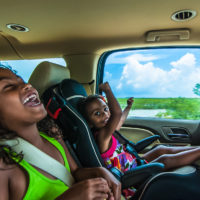Safety Researcher Finds Back Seat Less Safe than Previously Assumed

The Insurance Institute for Highway Safety (IIHS) is a private research group dedicated to testing vehicles for roadway safety. The organization has now published a study examining whether the back seat is as safe a place to travel as the front seat. Below, learn about the safety shortcomings of the back seat in a crash, and contact an experienced West Virginia personal injury lawyer if you or your child is injured in a crash.
Car makers focus safety on front seat passengers in auto accidents
Historically, vehicle manufacturers have focused their attention on improving safety for front-seat vehicle occupants, since those riding in the front seat absorb the lion’s share of the force of impact in a front-end crash. While it may be true that front-seat occupants are at a greater risk of injury in a front-end crash, this focus on improving the safety of the front row has put back seat passengers at a relative disadvantage. Recent years have brought a number of improvements to the safety of riding in the back seat. Most notably, more cars come standard with airbags that protect rear-seat passengers. However, the back row still lacks many of the protections afforded to front-seat vehicle occupants.
The IIHS has long noticed a difference in safety for front-and back-seat occupants. The group is now seeking to create a vehicle evaluation protocol that will offer insights on how different vehicles protect their back seat passengers or fall short. Recently, the IIHS released a study of 117 crashes that resulted in serious or fatal injuries to back seat passengers, examining the types of injuries that these passengers sustained most often in a crash. The study revealed that one piece of safety technology that protects front-seat occupants, but not those in back, could have been very useful in preventing back-seat injuries. Front-row seatbelts almost always come equipped with load limiters. These devices will increase seatbelt tension in the event of a sudden stop or crash and will loosen if the belt seems so tight that it might cause a crush injury. Back-seat occupants, whose seatbelts do not have load limiters, are much more likely to suffer injuries to the abdomen, spine, and chest. The IIHS study found that back-seat occupants often experienced chest force, no matter their age or size. Researchers are now considering new protections for back-seat occupants, such as making load limiters more common in back-seat seatbelts, and the possibility of installing airbags that inflate out of seatbelts. As safety research advances and uncovers ways that safety technologies can be improved to protect passengers, vehicle manufacturers have an obligation to implement these technologies in their vehicles.
Legal Help is Available after a Serious West Virginia Car Accident
If you or a loved one has been injured in a West Virginia car accident, find out how to get vital money damages for your injuries by contacting the knowledgeable and effective Martinsburg injury accident lawyers at Burke, Schultz, Harman & Burke for a free consultation on your case at 304-263-0900 or (304) LAWYERS.




